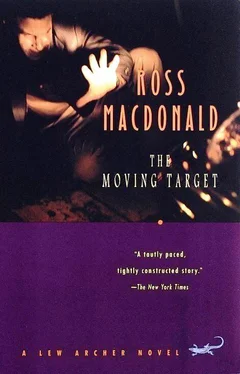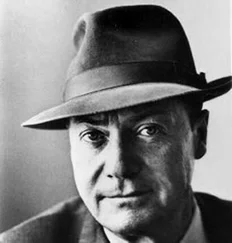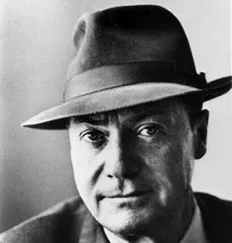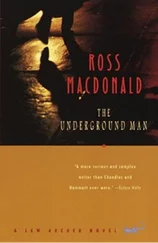The night was no longer young at the Wild Piano, but her heartbeat was artificially stimulated. It was on a badly lit sidestreet among a row of old duplexes shouldering each other across garbage-littered alleys. It had no sign, no plastic-and-plate-glass front. An arch of weather-browned stucco, peeling away like scabs, curved over the entrance. Above it a narrow balcony with a wrought iron railing masked heavily curtained windows.
A Negro doorman in uniform came out from under the arch and opened the door of the cab. I paid off the driver and followed him in. In the dim light from over the door I could see that the nap of his blue coat was worn down to the bare fiber. The brown leather door had been stained black around the handle by the pressure of many sweating hands. It opened into a deep, narrow room like a tunnel.
Another Negro in a waiter’s jacket, a napkin over his arm, came to the door to meet me. His smile-stretched lips were indigo in the blue light that emanated from the walls. The walls were decorated with monochromatic blue nudes in various postures. There were white-clothed tables along them on either side, with an aisle between. A woman was playing a piano on a low platform at the far end of the room. She looked unreal through the smoke, a mechanical doll with clever hands and a rigid immovable back.
I handed my hat to a hat-check girl in a cubbyhole and asked for a table near the piano. The waiter skidded ahead of me down the aisle, his napkin fluttering like a pennon, trying to create the illusion that business was brisk. It wasn’t. Two thirds of the tables were empty. The rest were occupied by couples. The men were a representative off-scouring of the better bars, putting off going home. Fat and thin, they were fish-faced in the blue aquarium light, fish-faced and oyster-eyed.
Most of their companions looked paid or willing to be paid. Two or three were blondes I had seen in chorus lines, with ingenue smiles fixed on their faces as if they could arrest the passage of time. Several were older women whose pneumatic bodies would keep them afloat for another year or two. These women were working hard with hands, with tongues, with eyes. If they slipped from the level of the Wild Piano, there were worse places to fall to.
A Mexican girl with a bored yellow face was sitting by herself at the table next to mine. Her eyes reached for me, turned away again.
“Scotch or bourbon, sir?” the waiter said.
“Bourbon and water. I’ll mix it.”
“Yes, sir. We have sandwiches.”
I remembered that I was hungry. “Cheese.”
“Very good, sir.”
I looked at the piano, wondering if I was being too literal. The woman who called herself Betty had said she was at the piano. Its hoarse voice threaded the irregular laughter from the tables in melancholy counterpoint. The pianist’s fingers moved in the keyboard mirror with a hurried fatality, as if the piano played itself and she had to keep up with it. Her tense bare shoulders were thin and shapely. Her hair poured down on them like tar and made them seem stark white. Her face was hidden.
“Hello, handsome. Buy me a drink.”
The Mexican girl was standing by my chair. When I looked up she sat down. Her round-shouldered hipless body moved like a whip. Her low-cut gown was incongruous – clothes on a savage. She tried to smile, but her wooden face had never learned that art.
“I should buy you a pair of glasses.”
She knew it was meant to be funny and that was all. “You are a funny boy. I like a funny boy.” Her voice was guttural and forced, the voice you would expect from a wooden face.
“You wouldn’t like me. But I’ll buy you a drink.”
She moved her eyes in order to express pleasure. They were solid and unchanging like lumps of resin. Her hands moved onto my arm and began to stroke it. “I like you, funny boy. Say something funny.”
She didn’t like me, and I didn’t like her. She leaned forward to let me look down her dress. The breasts were little and tight, with pencil-sharp nipples. Her arms and upper lip were furred with black.
“On second thought I’ll buy you hormones,” I said.
“Is it something to eat? I am very hungry.” She showed me her hungry white teeth by way of illustration.
“Why don’t you take a bite of me?”
“You are kidding me,” she said sulkily. But her hands continued working on my arm.
The waiter appeared and gave me a chance to break loose. He transferred from his tray to the table a small sandwich on a plate, a glass of water, a teacup with a half inch of whisky at the bottom, an empty teapot, and a glass of something he had telepathically brought along for the girl.
“That will be six dollars, sir.”
“I beg your pardon.”
“Two dollars per drink, sir. Two dollars for the sandwich.”
I lifted the upper layer of the sandwich and looked at the slice of cheese it contained. It was as thin as gold leaf and almost as expensive. I put down a ten-dollar bill and left the change on the table. My primitive companion drank her fruit juice, glanced at the four ones, and went back to work on my arm.
“You have very passionate hands,” I said; “only I happen to be waiting for Betty.”
“Betty?” She flung a disdainful black glance at the pianist’s back. “But Betty is arteest. She will not–” A gesture finished the sentence.
“Betty is the one for me.”
Her lips came together with a red tip of tongue protruding as if she was going to spit. I signaled a waiter and ordered a drink for the woman at the piano. When I turned back to the Mexican girl, she was gone.
The waiter pointed me out when he set down the drink on the piano, and the pianist turned to look. Her face was oval, so small and delicately modeled it looked pinched. Her eyes were indeterminate in color and meaning. She made no effort to smile. I raised my chin by way of invitation. Her head jerked negatively and bent over the keyboard again.
I watched her white hands picking their way through the artificial boogie-woogie jungle. The music followed them like giant footsteps rustling in metallic undergrowth. You could see the shadow of the giant and hear his trip-hammer heartbeat. She was hot.
Then she changed her tune. Her left hand still drummed and rolled in the bass, while her right hand elaborated a blues. She began to sing in a hard, sibilant voice, frayed at the edges but somehow moving:
Brain’s in my stomach,
Hearts in my mouth,
Want to go north –
My feet point south.
I got the psychosomatic blues.
Doctor, doctor, doctor,
Analyze my brain.
Organize me, doctor.
Doctor, ease my pain –
I got the psychosomatic blues.
She phrased her song with decadent intelligence. I didn’t like it, but it deserved a better audience than the chattering room behind me. I clapped when it ended and ordered her another drink.
She brought it to my table and sat down. She had a Tanagra figurine body, small and perfect, poised tunelessly somewhere between twenty and thirty. “You like my music,” she stated. She inclined her forehead and looked up at me from under it, the mannerism of a woman proud of her eyes. Their brown-flecked irises were centerless and disturbing.
“You should be on Fifty-second Street.”
“Don’t think I wasn’t. But you haven’t been there for a while, have you? The street has gone to the dogs.”
“There’s no percentage in this place. It’s going to fold. Anybody can see the signs. Who runs it?”
“A man I know. Got a cigarette?”
When I lit it for her, she inhaled deeply. Her face unconsciously waited for the lift and drooped a little when it didn’t come. She was a baby with an ageless face, sucking a dry bottle. The rims of her nostrils were bloodless, as white as snow, and that was no Freudian error.
Читать дальше












